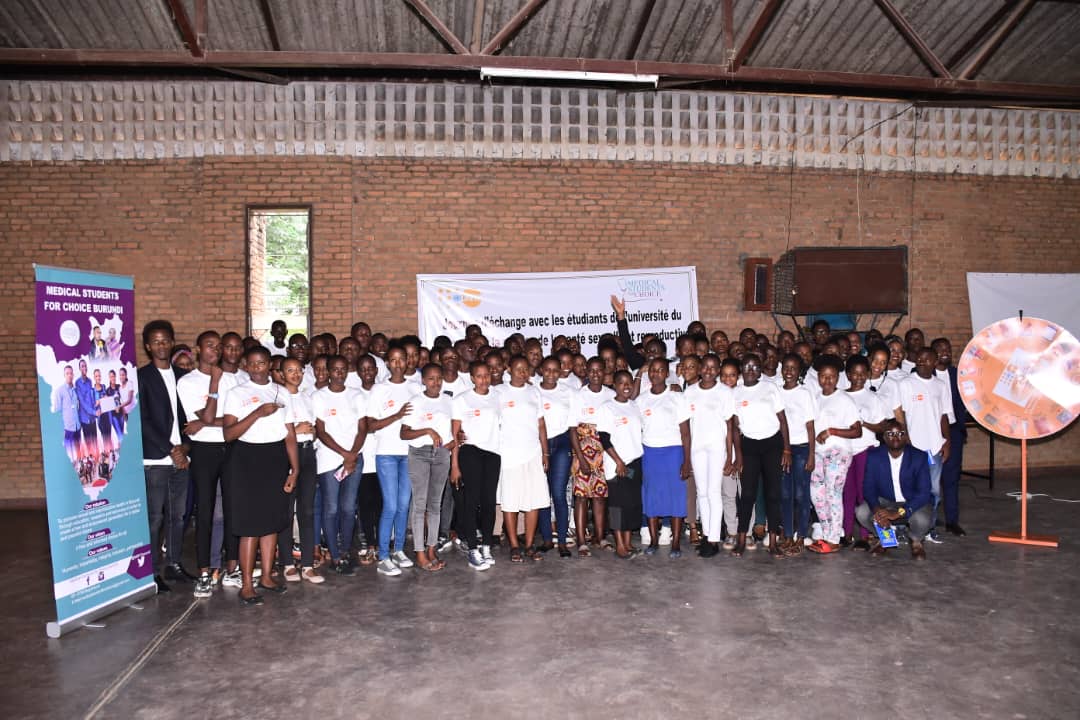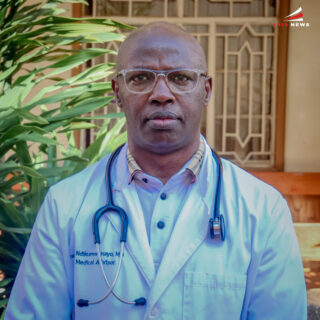
- In universities, few resist the pressure to taste sexual intercourse due to unlimited ‘freedom’ and inciteful practices.
- Poverty, excessive consumption of alcohol and narcotics increasingly expose students to certain practices that endanger their lives, pushing them to engage in sexual relations that happen at some cost including possibility of contracting sexually transmitted infections (STIs) HIV/AIDS and unwanted pregnancies.
- In 2021, in the field of Psychology at the University of Burundi, at least 15 girls in their first year of undergraduate program got pregnant; 10 of them were forced to marry those who impregnated them.
«Medical Students for Choice» commits to providing access to safe and reliable Sexual and Reproductive Health information in universities.
While the issue of unwanted pregnancies in fundamental and post-fundamental school has attracted significant interventions by public authorities, NGOs and other actors in education, the same issue in universities goes unnoticed.
One could argue that university students know what they do since they are ‘adults’ before the law. However, it is clear that they struggle with their academic journey when the unexpected occurs. They fail to attend classes and sometimes they drop out indefinitely. Those who managed to continue their schooling, their academic performance deteriorates and finding employment after graduation becomes more challenging.
According to the responses to the survey conducted by Medical Students for Choice Burundi in the field of Psychology at the University of Burundi, at least 15 girls in their first year of undergraduate program got pregnant; 10 of them were forced to marry those who impregnated them.
With the aim of helping curb this situation, Medical Students for Choice Burundi and UNFPA, in collaboration with the University of Burundi (Campus Mutanga, Kamenge, Rohero and Kiriri) organized capacity building sessions for university students on Sexual and Reproductive Health; about 300 students participated.
Universities are left out of the Adolescent and Youth Sexual Health Program
Universities are not always taken into account in statistics related to the Sexual and Reproductive Health of young people and adolescents, efforts often being concentrated on earlier cycles.
In addition, while university students like other young people hope to learn on internet, the information found online sometimes appears contradictory and unreliable. As a result, they are misguided and remain ignorant, unable to control their sexuality.
At home, university students remain children who are denied socio-economic autonomy. They are subject to taboo cultural practices that cover sexuality in Burundi. This is a kind of people the academic space receives each year. Having not been trained on how to manage their private lives far away from the eye of a parent or supervisor, with the freedom they find at university, they turn reckless in the name of leading an independent lifestyle.
“Medical students for Choice Burundi” envisions to teach young people in the first year of undergraduate program on the management of their sexual and reproductive health in order to avoid the consequences borne of poor choices and ignorance.




Urgent interventions are necessary
During the workshops, the organizers explained both modern contraceptive methods and natural ones to allow participants to pick one they prefer and which does not undermine or compromise their religious beliefs and/or culture.
It was shocking to discover that more than half of the students did not know how their menstrual cycle works, let alone determining the fertile period. It was also clear they were unaware that they could get this information in the health facilities. The fact that sexuality remains taboo in Burundi discourages young people from publicly seeking information on their sexual drives.
The medical trainers communicated in a language accessible to all, what should be the objectives of a university student and the path to take to achieve them. They also touched on the possible barriers. They thus addressed the psycho-emotional evolution of adolescents, early marriages, unintended pregnancies, sexually transmitted infections including the HIV virus among others.
The three sessions – each lasting around 3 hours – were not enough to answer the questions of seemingly fascinated participants. They barely retained the features of each contraceptive method, the use of condoms or the conditions of application of natural methods. Several questions remained unanswered.
Fair to say, however, that Medical Students for Choice Burundi, thanks to the support of UNFPA Burundi, will have contributed to the reduction of surprise pregnancies and STIs for at least 300 young girls and boys enrolled at the University of Burundi by strengthening their capacity on the basics of Sexual and Reproductive Health. Similar interventions allowing these students to gain knowledge on Sexual and Reproductive Health are needed.



